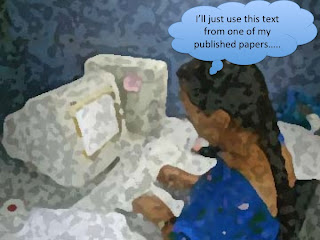Is self-plagiarism possible?
Let's first define what this is. Basically, it refers to the reuse of significant portions of one's own work, with identical or nearly identical wording or formatting and without citing the original work or otherwise revealing that you are repeating something previously published.
I think the term self-plagiarism is confusing and potentially inaccurate since plagiarism is generally defined as the presentation of someone else's words or ideas as your own. Based on this definition, it seems impossible to plagiarize oneself. However, if the definition of plagiarism includes the presentation of words or ideas as new and original, then cutting and pasting from your previously published work without attribution might be considered plagiarism.
Whatever it's called, some ethicists seem to consider reuse of previously published material to be dishonest. However, there are some gray areas.
Duplicate publications are clearly fraudulent, but what about reusing short descriptions...of methods, for example? Many of us use the same techniques in multiple studies, and there are only so many ways one can describe these procedures. How different should each version be? Earlier in my career, it never occurred to me that reusing a short description of a method was wrong. I'm sure I've stated some variation on this sentence in many papers: "Data were transformed where necessary to meet assumptions of statistical tests." Is that self-plagiarism? Or is it simply more efficient to reuse a standard description? What about several sentences or a paragraph describing a specific sequence of steps in a protocol? Again, there are only so many ways one can reword such descriptions without producing a longer and more abstruse narrative.
What I now do is to write methods descriptions from scratch, envisioning each step but without referring to previous written descriptions. Unfortunately, what happens is that I will often unconsciously repeat what I've previously written...in some cases, almost verbatim. When that happens, I will deliberately rephrase the new version so that it is different from earlier publications. Another solution is to describe the method in detail in the original paper and then cite that paper in succeeding articles in which you provide a much briefer summary.
Another situation is the review paper. Some authors freely extract summaries and other sections of their published work and combine them into a review article. Along with text, figures and tables from earlier work may be included in the review. I know some authors who would not see anything wrong with this since it is their published work they are copying. However, ethicists would likely consider this self-plagiarism. If, on the other hand, the review was a true synthesis with a new analysis and novel discussion of the body of work, then brief summaries (rephrased) of previous work would be necessary to lay the groundwork for the new work.
Most people recognize that recycling of published work is unethical; however, it can also be illegal if the author has signed over the copyright to a publisher. For most scientific articles, this would be the case. This is why you should not reuse figures or tables (in their original formatting) from one of your published articles in a review paper or book, for example, unless you've gotten written permission from the original publisher. It does not matter if you created those original figures using your own data. When you signed that copyright transfer form, you turned over the rights to those formatted components to the publisher. The same would be true of any segments of text taken verbatim from a published article and inserted into a new paper. Most publishers (in my experience), however, will give permission to reuse or modify a figure, photograph, or table, especially by the original author.
Bottom line...it's probably prudent to avoid reusing text from your published articles. It's easy enough to rephrase things sufficiently to avoid charges of self-plagiarism.

No comments:
Post a Comment